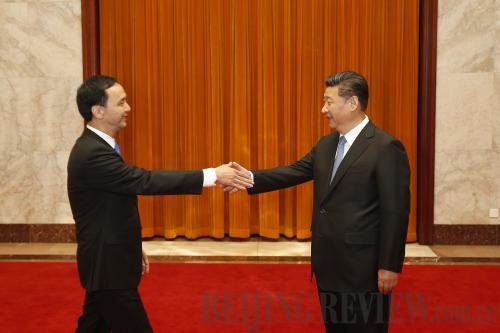
General Secretary of the CPC Central Committee Xi Jinping (right) meets with KMT Chairman Eric Chu in Beijing on May 4 (CNS Photo)
KMT chairman's mainland visit sets the tune for the peaceful development of cross-Straits relations
On May 4, Kuomintang (KMT) Chairman Eric Chu met with General Secretary of the Communist Party of China (CPC) Central Committee Xi Jinping at the Great Hall of the People in Beijing, making Chu another sitting KMT chairman to set foot on the mainland since 1949, when the KMT fled in exile to China's eastern isle of Taiwan after their defeat at the hands of the CPC-led forces.
Both sides of the Taiwan Straits should build a community of shared destiny and settle political differences through consultation as equals, commented Xi in a speech he made during his meeting with Chu.
Observers believe the high-level meeting between the leaders will help strengthen cross-Straits ties ahead of the island's leadership elections next year, as well as consolidate the importance of the one-China policy in the midst of a changing political landscape in Taiwan.
At the meeting, Xi, also President of China, said that cross-Straits relations have entered a critical phase, and that both the CPC and the KMT should work together to shape the future of cross-Straits development.
Xi did not exclude the possibility of cooperation with other political parties on the island, while warning that any acts aimed at "Taiwan independence" would hurt cross-Straits ties and harm all Chinese people.
"We have upheld the 1992 Consensus as the foundation on exchanges with the authorities and various political parties in Taiwan," Xi said.
The 1992 Consensus was the outcome of a meeting in Hong Kong in November that year between the mainland-based Association for Relations Across the Taiwan Straits and the Taiwan-based Straits Exchange Foundation. It is an agreement of acknowledgment by both sides that the Chinese mainland and Taiwan belong to one and the same China. It has served as the framework and foundation for cross-Straits interaction ever since.
Xi called for both the mainland and Taiwan to be on high alert against statements such as "one country on each side" and "one China, one Taiwan," which will bring neither peace nor development.
Chu reiterated Xi's reference to building a community of shared destiny, and said that the 1992 Consensus has served as an important foundation of cooperation across the Straits.
Chu also said Taiwan should be able to play a vital role in regional economic efforts like the Asian Infrastructure Investment Bank (AIIB) and the Belt and Road Initiative, as well as the Regional Comprehensive Economic Partnership, an ASEAN-led trade agreement linking the economies of 16 Asia-Pacific countries and regions.
"Voices have emerged in Taiwan that hold a distorted view of cross-Straits relations following the outbreak of the 'Sunflower Movement' last year [a protest staged against the Cross-Straits Economic Cooperation Framework Agreement, a preferential trade agreement that aims to reduce tariffs and commercial barriers between the two sides]. The Democratic Progressive Party (DPP) has also influenced the Taiwanese public with its confrontational view toward the 1992 Consensus," said Li He, Vice Director of the Beijing-based National Society of Taiwan Studies.
The 1992 Consensus was inscribed into the KMT party goals in 2005, after then KMT Chairman Lien Chan made the first ever trip to the Chinese mainland by a KMT chief since 1949.
Observers hold that despite some in Taiwan proposing to revise or even to revert the consensus, it will continue to serve as the fundamental principle of cross-Straits interaction and will not change over time.
"Chu's commitment to the consensus is a positive sign. It is important for the KMT to adhere to this bottom line in a time when some among Taiwan's public have become more distant from the mainland," said Hu Benliang, an associate research fellow at the Institute of Taiwan Studies of the Chinese Academy of Social Sciences (CASS).
Li believes that with Taiwan's next leadership election approaching in early 2016, stable cross-Straits relations are an essential aspect that the next Taiwan leader needs to maintain, and that Taiwan should continue to uphold the 1992 Consensus regardless of who will take the leadership position.
















































